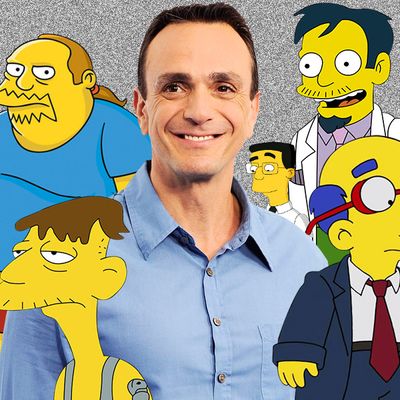
Over the course of 25 seasons, Hank Azaria has voiced approximately 8,000 different characters on The Simpsons. (We could be off by a few.) You know him as Moe, or Chief Wiggum, or Apu, or Dr. Frink, or the Sea Captain, or Superintendent Chalmers, or, according to the Simpsons Wiki, “Hey Hey Guy.” Azaria probably doesn’t remember voicing that long-forgotten party animal, but otherwise, the Queens-born actor, who’s been a welcome addition to Showtime’s Ray Donovan this season, has a near-encyclopedic memory of his many characters. We recently had the chance to speak to him about five of them.
Dr. Nick Riviera
Azaria: Dr. Nick was this quack doctor that appeared in a very early script, and he definitely had this thick Latin accent, so my mind just went to, it would be really funny to have him sound like Ricky Ricardo. He’s basically a bad Ricky Ricardo, Desi Arnaz impression.
And you’ve gone 25 years without having him yell, “LUCY.” That’s impressive.
Which is surprising. It was a writers’ creation, and then I added the silly voice. That happens a lot. People seem to like whatever we’re doing, so [certain characters will] come back, though I don’t think Dr. Nick has ever really gotten his own episode with a serious story line.
I think the closest thing to it is his ER parody in “22 Short Films About Springfield,” but I’m not sure if that counts. Of the characters you voice, are you surprised that any of them became as popular as they did?
A lot of them. I mean, Apu is one. He wasn’t supposed to have anything other than a line or two when Homer comes into the Kwik-E-Mart. Same with Comic Book Guy. Even Moe got expanded more than they ever expected. Superintendent Chalmers, too. I think you can say this about a lot of these characters. There are just as many characters I did as a one-off that didn’t capture anyone’s imagination, but I think just by definition, I was there to do these oddball weirdos, and if they amused us, they’d come back. And look, after 552 episodes … if they’re looking for new story lines, it’s like, “Why don’t we do one about Comic Book Guy?”
Cletus Spuckler
Literally, he was written in as, I think, “Slack-Jawed Yokel.” He didn’t even have a name, so I just kind of loosened my mouth and started talking in a hillbilly accent. I figured “slack-jawed” was a clue; I genuinely tried to be slack-jawed. It was another of those characters, he just amused everybody, so he kept finding his way back.
Do you do any research if, for instance, you know you’re going to be voicing someone from the Deep South, or an immigrant from India?
It’s funny. When I do it in a movie, the answer is yes, like in The Birdcage with the Guatemalan accent. I really worked hard on that. Or Along Came Polly, I worked hard on that French accent. But on The Simpsons, I don’t have time. They don’t tell me three weeks in advance, “You have an Indian accent coming up, so let’s start working on that.” So I have to toss out what my best version of it is in the moment. Like my Irish is okay. Over the years, I’ve had to do a British accent so much that it’s gotten pretty good, and when I first did French, it wasn’t great. But then I worked on it so hard for Along Came Polly that it got pretty good. Once the characters’ voices are established, I don’t go back. I don’t try to improve it. It’s a parody; we’re not really there to offer up some kind of perfect version. As long as it’s funny, it’s all I really care about.
With so many established characters, how often are you asked to do a new voice these days?
There’s potential for that all the time, but now it’s about twice a year that I’ll really do a new voice or a new character, partially because I’ve run out. I mean, I do other voices, but they’re either too out there, or too similar to something else I’m doing, or too similar to something someone else is doing to really use it. In the early seasons, there’d be, like, 20 new guys a year.
Comic Book Guy
Comic Book Guy was introduced early on, and they had written him really well — he seemed like an overgrown child. That was one of those voices I had ready to go. By the time I did The Simpsons, I was young, 23 or 24, and I already had like 30 to 40 character voices; some were celebrity impressions and some were just people I knew with voices that tickled me, and Comic Book Guy was one of them. He sounds like a guy who lived next door to me freshman year of college. I just started imitating the way he talked. It wasn’t exactly like him — that guy had more of a thick Boston accent. I’m not sure where that voice came from. It just really amused me to talk that way.
Every word he says is so declarative.
He’s a know-it-all fanboy, like that guy was. He was very didactic. He made announcements. He had a list. He would tell everybody if they were in his top five or bottom five of the week.
Where were you?
I often made one or the other. It varied week by week. It’s funny, when I did Comic Book Guy’s voice for the first time, the animators thought I was doing a direct Ralph Bakshi impression.
Kirk Van Houten
That’s an easy one. Milhouse had already been established, and sometimes, when you do characters that are related to each other, the easiest thing to do is to start with the original character. I just did my best Milhouse impression and made them sound like family, and because my voice is deeper than Pamela Hayden’s, it just sounded like Milhouse’s dad. I pretty much borrowed the rhythms and figured Milhouse had to be a chip off the ol’ block. Kirk’s such a loser that it seemed to fit with how they ended up writing for him.
Kirk’s the star of maybe my favorite Simpsons episode, “A Milhouse Divided.” I really like the dark episodes, and few are as dark as that one.
I do, too. Some people don’t, but I do. I love that one, I love the Frank Grimes episode [“Homer’s Enemy”], I really like “Cape Feare.” It’s a little sillier, but still pretty dark. I like how raw [“A Milhouse Divided”] got, emotionally. It’s actually uncomfortable at times.
Frank Grimes
The way I remember it is, I would go around saying, that was supposed to be William H. Macy. I know that was the prototype in [the writers’] heads, but that was one of those situations where [the character] was most likely going to go to a guest star like that, and they just had me temp record it. But I figured, on the chance that they leave my track in, let me really go for it. To me, it was one of the most emotional characters they ever wrote, especially as a guest, with the premise of, “What if a real human being encountered Homer Simpson?” And they really did such a good job writing it that I wanted to do him justice. I can’t really do a good Bill Macy impression, but I kind of had him, especially his character from Fargo, in my brain, and I tried to capture that. And I’m really glad that they ended up leaving it in.


